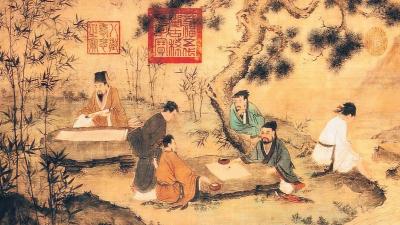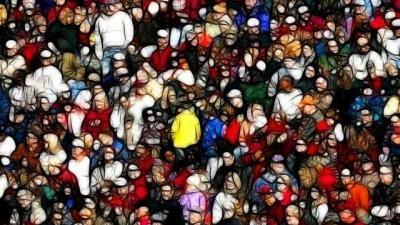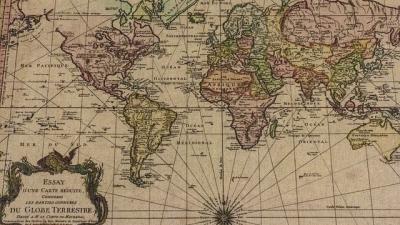The Empire Strikes Back: Reflections on Chinese 'Tianxia'
The normal polemic against the so called 'civilisational states' such as China, for example, is that they can be pigeon holed merely as 'authoritarian', that they are, in fact, aberrations on the road to the full model of 'liberal democracy'. It is their inherent 'backwardness', inability to reform, not quite 'all in' on the merits of liberal democracy, that keeps them locked up in Plato's cave.
The tensions in the grossraums of the world, however, reflect a fundamental shift in the nomos of the earth. Nomos was the Greek phrase used to describe these lurching, giant empires (or civilisational states) and their remit to devour the world, from the Roman Empire onwards. 'Nomos' derives from a state's geographical, cultural and resource domination. The 'Jus Publicum Europaeum' which came out of the end of the Holy Roman Empire, up until the Peace of Westphalia of 1648, formed the basis for European hegemony. The move to nation states after Westphalia, signalled the start of the confusion, the weakness of the Occident.
The rise of civilisational realms coincides with a pandemic of self mutilation within the liberal democracies of the west. Whilst the main issues in the US and the UK should be to address systemic economic problems and declining production and innovation, the main accepted form of debate revolves around 'diversity'. The Occident lacks the 'telos' of a refined civilisational ethos, it has lost the internal dynamic which saw liberalism as an ideology triumph in the nineteenth and twentieth centuries under the auspices of a certain type of 'realpolitik'. The current Anglo-American system, based on dollar hegemony, is in structural crisis. It represents a shift in geopolitics away from western conceptions of a global order. Yet the metamorphosis towards a new world order is not one only of geopolitics and resource domination, although that is also critical. The real tide forming on the shore of civilisation is a values based one; it is nothing less than a rejection of liberal democracy and a new ideological vision, in effect, the end of liberal democratic values, but not the end of history. The tide is foaming in boundary regions also, in the peripheries, in Central and Eastern Europe, the Americas, a wholesale questioning of the ethos of a culture in crisis.
Whilst the Enlightenment was the intellectual precursor to liberalism, is there an iconoclastic Oriental reformation at present? All Empires or Civilisational states require an underlying practical and theoretical thought which 'reimagines' the world. The Greek 'polis', the Roman 'Imperium', the Christianity of the Holy Roman Empire, all offer a type of cosmopolitanism undercut by values. It is not enough the chauvinism of Eurasianism or India's Hindu nationalism. In China, amongst intellectuals, there is talk of xin shidai, or a 'new era'. The new draughtsmen of the world are at work, and they aren't emanating from the liberal soapboxes of western universities. The Chinese philosopher Jim Huimin talks of a 'Chinese cultural self confidence'[1], taking 'Tianxia' to the world. The Tianxia School ('all under heaven') seek to employ Chinese historical sources, rather than western imitation, such as Marxism, as its new intellectual weapons. Tianxia sees itself as a new 'world empire 2.0' according to Jiang Qing. The Tianxia doctrine tries to combine Chinese particularist thinking (an opposition to globalisation thinking) with a new universalism based on a prototype of the Japanese imperialist Kyoto school of the 1940s. This is revanchist, however, as it models itself on a Pan-Asian vision of tributary states. So, whilst the Tianxia doctrine exalts a world of inter-civilisational concord, respecting harmony in an integrated twenty first century, the battle will be to constrain its new imperial tendencies. This tension can be seen in foreign academia where, for example, Christian Uhl explores the contra forces at work in 'Veiling Ideology or Enabling Utopia'[2].
Cultural particularism therefore would tend to deny any form of universalism, whether the liberal democracy of the West or the new 'Tianxia' of China. Cultural differences are so embedded into peoples that universal Kantian laws are usually vehicles for economic imperialism. Yet if we accept this 'cultural differences' conduit, we have the antinomy: cultural particularity but also chauvinistic exceptionalism. This is evidenced in China and Russia, and had its extreme form in the tragedies of Hitler's Germany. It is difficult to see the border between kindly 'Exceptionalism' and Germania or Welthauptstadt (world capital). These exceptionalist movements such as 'Pan-Islamism', Eurasianism, Pan-Slavism, for example, are genuine desires to rid themselves of western universalism. So there exists always a pendulum of tension, a dialectic between the two, between cultural difference and chauvinistic nationalism. The Third Reich indeed was an attempt at a European civilisational state in its extreme form. The Anglo American pushback was the then dominant liberal universal model on the cusp of disintegration.
China's 'Tianxia' then has remnants of the Japanese Kyoto school with its 'Hakko Ichiu' (Eight Corners of the World under One Roof') which, in theory, claimed to be a formative globalism in contrast to an Anglo American colonialism. The new Chinese version aims at new universal values of East Asia, through intercultural dialogue. The Chinese see the world engaged in a Manichean struggle between a dual world history; one of the Imperialism of Rome and the Tianxia system of universal harmony. Yet the Chinese don't equate Tianxia with Empire, and unfortunately there is not a semantic meaningful phrase to describe it. The Chinese argument is that Roman unilateralism pits itself against itself, state against state; in that it is the Carl Schmitt idea of 'friend or foe' at the heart of this entanglement. The western thought is always dualistic, remnants of the Christian, good and evil. Not nuanced or shaded. At heart the Liberal Occident which inherited Hegel's 'world spirit' of civilisational Europe has been a negligent host. And now the tide is turning out back into the night winds of the Orient. The new carrier of the spirit of the world belongs, say the Chinese, to the spirit of Tianxia, a form of universalism descending from the Emperor 'Duke Wen of Zhou' of 1043 BC. These were universal values which respected harmony and the individual culture of any dynasty. The Tianxia revolution would claim to be ecumenical and pluralist. For Jiang Shigong:
The difference between Chinese and western culture is that whilst Western culture consistently attempts to arrive at the resolution of any antagonism in favor of one of the original positions, Chinese culture consistently seeks to find the unity, which results in a pluralism based on ideas of harmony[3].
Yet for someone like Jiang Shigong there are visions of a Sinocentrism and world empire, socialism with Chinese characteristics. So, in this party polemic, it resembles the Eurasianism of Dugin. It may be theoretically pluralist, particularist, but in practice? It reads like a Confucian nationalism, dressed up in 'Tianxia'. Like 'globalisation' in the West it can begin as a theoretical academic idea and then become a neoliberal trojan horse in liberal clothes.
The Chinese project of 'Tianxia' then will only be measured in its practical application and the reality of its geopolitical machinations. Will that be mendacious or harmonising? For many it may look like an Imperial China 2.0. For others it may indeed be an inclusive civilisational order. It could be more than likely a transition to a Spenglerian new era as one civilisational dynasty, Liberalism, occludes and falls into the 'polemos' of night[4]. Empires fall because of the inability to tolerate 'the other'. Or they forget the 'telos' of their existence, such as in Liberalism. The underlying project becomes corrupted and sinister; the worshipping of statues on Easter Island, the gorging of human hearts at Tenochtitlan, the building of sepulchred Cathedrals. Now Liberalism, where no elevator pitch could describe its Kantian origins, succumbs to internal incoherence.
Colonialism differs to imperialism. The underlying motif of Imperial Rome, or Napoleon pushing the virtues of the revolution across Europe was that they were sanctified by an idea. Nineteenth century colonialism, on the other hand, Britain's East India Company dominating the seas or the US exporting resource extraction in the twentieth century, were indifferent to an essential idea. The Duke of Zhou, the originator of Tianxia had spoken of a 'concentric politico civilisational order'[5], in this a harmonising benevolent empire with particularist traits. Henry Kissinger, no stranger to 'realpolitik' recognised a huge difference in Chinese and American thinking. The colonisation of the orient was accompanied by a missionary zeal of Christianity then Liberalism, a 'correct' doctrine. ChinaTown espouses a new cultural, rather than missionary export. It is not to convert, it is said. It is based on Confucian 'filial piety'. Henry Kissinger noted that 'American exceptionalism is missionary, China's exceptionalism is cultural'[6]. The cultural, particularist method has merit, for when the subject of the mission is in ruins, sick in the jungle, it is Conrad's Heart of Darkness with Captain Kurtz stuck in the jungle, reading Eliot's The Wasteland.
[1] Jin Huimin, Cultural Self-Confidence and Constellated Community: an Extended Discussion of Some Speeches by Xi Jinping, Telos 195 (Summer 2021).
[2] Conference Alternative Models of Geopolitical Order. Tsinghua University, China. 24.5.2021.
[3] Jiang Shigong, Philosophy and History: Interpreting the Xi Jinping era through Xi's Report to the Nineteenth National Congress of the CCP.
[4] Polemos: In Greek mythology the personification of war. But the pre-Socratic philosopher Heraclitus described Polemos as "both the king and father of all", with the capacity to bring all into existence and to annihilate.
[5] Xu Jilin,The New Tianxia www.readingthechinadream.com
[6] Henry Kissinger (2011). On China. London: Penguin.
Read also
Even the Poets are Killing: Fico and the New Iron Curtain
The Slovak 'Lee Harvey Oswald' was a 71 year old poet. It's what poets do these days. No waltzing around daffodils in the Lake District or smoking Opium a la Coleridge.
Brian Patrick Bolger
'Post-Liberalism' – Reflections on the Revolution in Europe
We have now entered the stage of post-Liberalism. The European elections have seen a move to traditionalist parties in most states.
Brian Patrick Bolger
The End of Globalisation
There seemed to be an inevitability in the talk of globalisation and the 'end of history' which ushered in the twenty first century.
Brian Patrick Bolger
The War on Bugs
If it wasn't for Covid, War and Bugs the master race of Homo Sapiens would have little to occupy themselves with. Now it is Bed Bugs, in Paris and London, encircling European cities like the plague of Oran.














Comments (0)